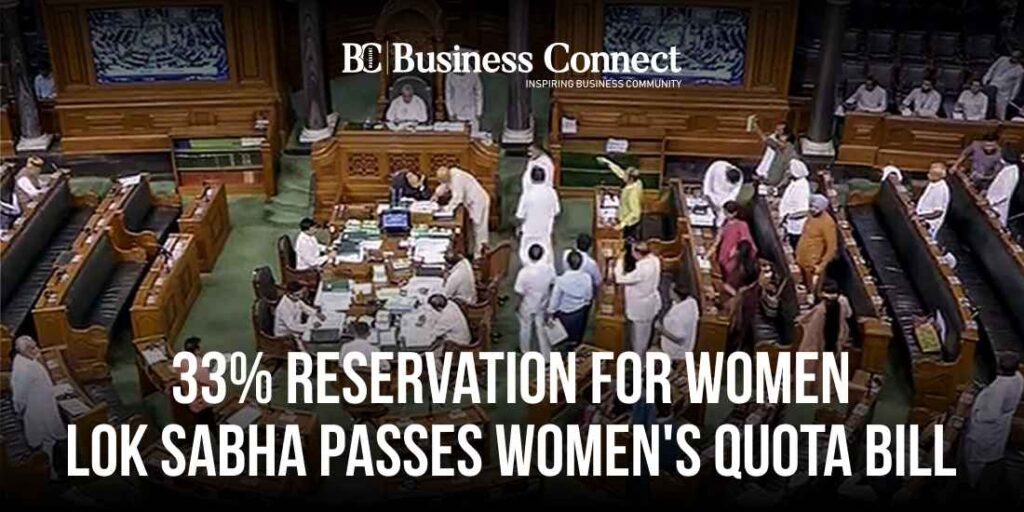33% Reservation for Women: Lok Sabha Passes Women’s Quota Bill
Written by Sanjay Kumar
In a historic move, the Women’s Quota Bill, which provides for 33 percent reservation for women in parliament and state assemblies, successfully cleared a crucial hurdle as it was passed in the Lok Sabha after hours of intense debate. This landmark development marks the first time the bill has been introduced and passed in the lower house of India’s parliament.
Here are the top 10 key points:
Parliamentary Approval: The bill received approval through a voice vote in the new parliament during a special five-day session convened to commemorate India’s 75 years of independence.
Overwhelming Support: The bill garnered substantial support, with 454 Members of Parliament (MPs) voting in favor of it. Only two MPs opposed the bill’s passage. The bill is set to be presented in the Rajya Sabha, the upper house of parliament, on Day Four of the ongoing special session.
Implementation Delay: Notably, the implementation of the quota is contingent upon conducting a census and delimitation exercise, which is expected to extend the timeline by at least six years. This aspect has become a focal point of contention among political opponents.
Amit Shah’s Assurance: Union Home Minister Amit Shah clarified that both the census and delimitation processes will commence after the forthcoming general elections, offering assurance that the bill’s execution remains a priority.
Historical Context: This marks the first time the Women’s Quota Bill has successfully passed through the Lok Sabha. In 2008, a similar bill introduced by the UPA government only managed to clear the Rajya Sabha before being derailed by demands for quotas for Other Backward Classes (OBCs).
Opposition’s Accusation: Amit Shah criticized opposition parties for allegedly lacking the determination to push through the bill, accusing them of playing politics with this vital legislation.
Sonia Gandhi’s Perspective: Congress leader Sonia Gandhi, in her opening remarks during the debate, emphasized that the impetus for the bill was initiated under the UPA government. She expressed concern about the prolonged wait for women and called for the immediate implementation of the bill. Furthermore, she advocated for the inclusion of women from Scheduled Castes (SC), Scheduled Tribes (ST), and Other Backward Classes (OBC) communities in the reservation.
Rahul Gandhi’s Insights: Rahul Gandhi, also from the Congress party, voiced skepticism regarding the necessity for a new census and delimitation for the bill’s execution. He questioned whether this might be a deliberate tactic to delay its implementation by several years.
The passage of the Women’s Quota Bill through the Lok Sabha is a historic moment in Indian politics, representing a significant step toward achieving gender parity in the country’s legislative bodies. As the bill progresses to the Rajya Sabha and undergoes further scrutiny, the nation watches with anticipation as it moves closer to becoming law.
Must Read:-
- Stock Market Update
- Top 10 shoe brands in India for men & women 2023
- Top 10 Adorable Gifts for Your Special One
- Top 10 Countries with Maximum Indian Population as Citizens
- Top 10 Small Business Statistics You Need to Know For 2023
- Top 10 highest-paid CEO in the World
- Top 10 richest person of India
- Top 10 Highest-Paid CEOs of India
- Top 10 Most Selling Bikes and Scooters of 2022 in India
- The Success Story of Jeff Bezos
- Success Story Of Elon Musk
- Top 10 Business Newspaper In India



